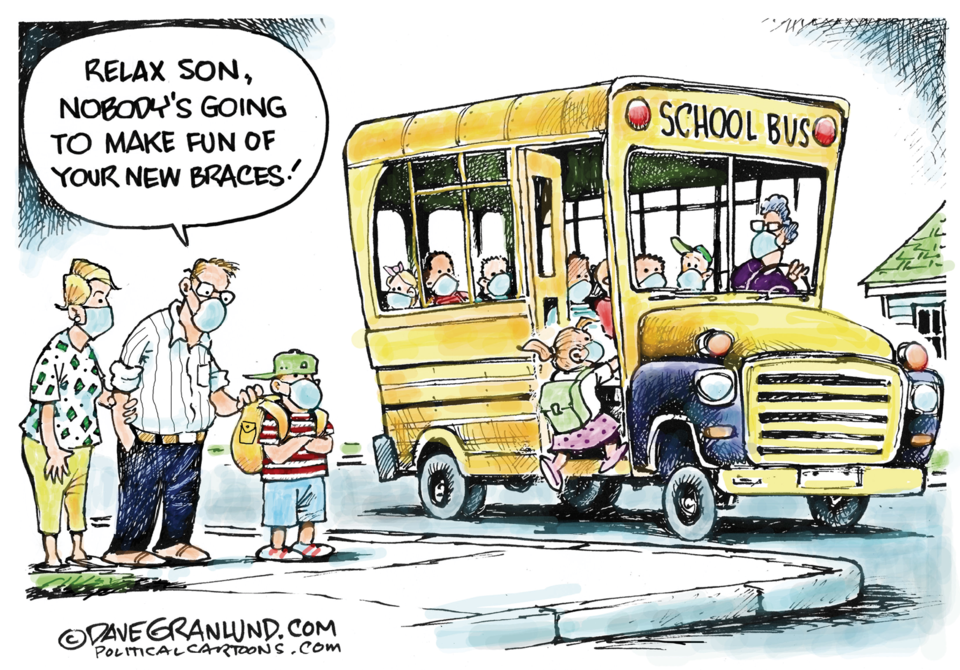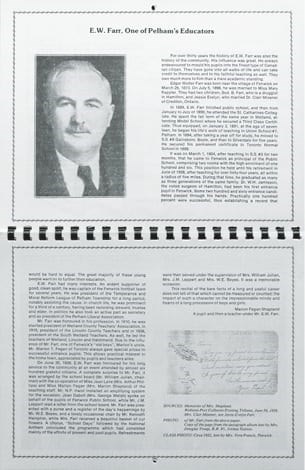Growth, okay, but don't cut corners on design, space
How sad it is to see what is happening to our town. I know, my son constantly tells me, “It’s progress.”
Does progress have to be ugly, and cramped? Who would want to live within three feet of Port Robinson Road & Rice Road? Who would want to live in an ugly condo on Highway 20? (Just my opinion.)
Our town “fathers” seem to be entertaining the building of granny suites at Pancake and Haist. Entertaining the larger lots to be split? Alan Crescent. Hopefully these will not be a consideration.
We have a lovely feel-good community becoming a disaster, a typical builder’s ugly, cramped space. The town is growing, but let’s keep it a place to be happy in.
Joan Eby Fonthill

Entire new cultural approach needed for elders
I read Larry Cote’s perspective on the pandemic and seniors [“Pandemic takeaways,” Op-Ed, August 5, p. 4] and from my perspective, being a senior, I think the most important takeaway society can learn from this pandemic is that we need a change in societal culture regarding seniors. Let me give you a comparative to explain this comment. We knew very early on that this pandemic was particularly devastating to seniors or “the elderly” as we are referred to by younger generations. Initially, did anyone focus on the elderly knowing this population was so susceptible? The answer is no, and I am of the opinion it is because of our existing culture.
Early on when it was obvious this pandemic was targeting seniors, I had a conversation with a friend in Aklavik, NWT where I lived for three years (my parents for 15 years, long ago). She said she and others were busy securing the elders, making sure they were protected from COVID-19. It struck me that here in Ontario (and across most of Canada), there was no special action being taken to protect the elderly we knew were collected in nursing homes. Although most seniors had aging-related problems physically and/or mentally, they weren’t all bed ridden or mentally incapacitated. There were a lot of varied reasons why seniors were in nursing homes. Did the government create a front-line healthcare program targeting senior homes to protect them? No—in fact these seniors were ignored for the most part, even as the death toll mounted and it became painfully clear seniors was the leading population dying. Did we move in to help? No—in fact we went the other way initially, and steered clear of nursing homes. Even workers at nursing homes appeared to be excused if they no longer wanted to show up for work, leaving seniors to fend for themselves.
Why did society take such a callous view? That is the existing culture. If we did care, there were initiatives that could have been undertaken with some of the millions (billions?) of dollars the government was willing to spend fighting the virus and protecting Canadians. Right at the beginning, when it was known the disease was killing seniors, why not assign front-line healthcare workers to nursing homes who could police those individuals who wanted to enter these residences, in an attempt to keep COVID-19 out?
It would have stopped the residency workers who were moving between nursing homes, likely spreading the virus from nursing home to nursing home. Why not pay additional staff or volunteers to do a serious cleaning of these residences and maintain regular cleaning, ensure hand washing, provide masks, put colored tape on the floor to show traffic patterns to mobile seniors and basically protect seniors? No government initiative here, it didn’t happen. Why?
The comments I heard from people and read on the internet will likely not surprise you.
“This is a blessing for many families; they lived a good life; it will save on insurance and pension payouts; they were going to die soon anyway; sarcastically—nature’s way of culling the herd; and the classic “they are old.”
That is the existing culture of how the elderly are treated in Canada (and many other countries). If the pandemic had targeted daycare centres you could expect a completely different response. That is the existing culture.
If we learned anything, we should learn from the culture of our Indigenous communities how seniors are treated with respect and dignity and in times of calamity get prioritized protection. That is the existing culture. In the Indigenous communities it is a priority to “protect our Elders.” What a difference in cultures! The difference is reflected in the very definitions given to seniors. According to the Merriam-Webster dictionary, "to be elderly” is defined as “rather old.” If you Google “Indigenous Elder” the definition is, “they are deeply committed to share their knowledge, provide guidance, teach others to respect the natural world.”
I’d suggest we should adopt the Indigenous culture regarding seniors and replace the term “the elderly” with “elders,” and with education of the younger generations reverse the existing culture of ignoring and/or caring less of seniors. Seniors are the experienced and deserving pioneers that come before each successive generation. We will all end up as seniors. Knowing how we will be treated and referred to by subsequent generations, we may want to begin this education sooner than later.
Pat Reid Fonthill

Pelham should introduce vote by mail
To vote, or not to vote, that is the question that has occupied my thoughts over the past weeks. In case you wonder, being an immigrant to Canada, I have always proudly voted in every election since I took the oath of citizenship. I am Canadian by choice, so voting is no small matter to me. It is rather an acknowledgement of the privilege Canada has extended to me by her choice of granting Canadian citizenship to me.
So now, here I am, for the first time in 32 years of being a Canadian, asking myself if I should go out to vote—is it safe? Will everyone respect the rules? Like the rest of Ward 1 residents, I have received the paperwork in the mail, including the detailed instructions. I am encouraged to vote on September 3 because I live on the even- numbered side of the street. As someone with a scientific education, I kind of see the reasoning behind this, but does it make sense out in Ward 1? We’re not exactly high density here.
Would it not have made more sense to send us all a mail-in ballot, since you mailed the voter information to us anyway? I mean, really, just because we voted in person in 2018, things have changed—our municipal processes need to change too and adjust to reality. Think about it please!
I will still go out to vote, but I do believe we need to assess the way we conduct our local elections and change the way we operate in Pelham. We should be the future, not the past.
Barbara Stramm, B.Sc. Ridgeville
All-way stop on Nursery a great idea
Where to start?
The Town of Pelham placed a traffic counter outside my house on the Nursery Lane part of my property. This counter is now gone as the Town just wanted to study how much traffic is going off of Deerpark Crescent and Nursery Lane. I think the Town put this traffic counter on Nursery because they want to see if an all-way stop is needed at the current stop sign at Deerpark and Nursery. The current intersection requires you to yield the right of way to traffic driving past the intersection.
First, I would like to say an all-way stop has its advantages. This three-way stop will prevent potential accidents. I say this because you can’t see the right side of the intersection well when you stop at the stop sign coming off of Deerpark Crescent. This can be dangerous at times and to add further frustration there are cars parked on both sides of Nursery Lane. The part of the street that I’m referring to is the hill that comes off of Spruceside Crescent. I find it very difficult to drive through because there could be oncoming traffic coming from the opposite direction. They don’t always think to go very slowly, and as I drive up or down the hill I have had to almost drive into someone’s driveway to avoid an accident. A three-way stop wouldn’t solve this other issue of parking on the hill of Nursery Lane. There is enough room to park on one side of Nursery Lane and for traffic to drive up or down the hill safely.
In conclusion, the traffic counter was a good idea. I feel that a three-way stop is needed at Deerpark Crescent and Nursery Lane. This all-way stop will ease my anxiety of turning off of Deerpark Crescent onto Nursery Lane. How many of you think that an all way stop is needed at this intersection?
Brendan Young Fonthill
Open letter to the Niagara District School Board
Black Lives Matter and our Indigenous people are protesting and demonstrating in the streets. They have brought to the forefront the injustices that they have had and still endure. It seems as if this is the only way to be heard. Not only do we, as adults, see this, but so do our children. There is systemic racism everywhere in the world.
When students from Wellington Heights School, Fenwick, research the history of the Duke of Wellington, Arthur Wellesley, for whom the school was named, they will see that he was a racist. History shows he was “pro-slavery” and deemed it to be necessary in the islands.
During the War of 1812-14, he sent his best soldiers to defend Bytown (Ottawa) and had the Rideau Canal built to protect the town from the Americans. He basically said that Niagara was a lost cause and couldn’t be bothered getting involved.
The British in Niagara asked for help from First Nations, and they were a key part of the defensive network of British North America. John Norton, Teyoninhokarwen, Six Nations War Chief (1765-1831), recruited Six Nations and Delaware warriors to assist Major General Sir Isaac Brock. Along with Six Nations War Chief, John Brant, Ahyonwaeghs, Norton commanded warriors at the Battles of Fort George, Stoney Creek, and Beaverdams. The battle at Beaverdams was the most notable of Aboriginal victories. The cost was 20 warriors killed, 600 American soldiers killed. The Americans were turned back. If it were not for the bravery of these warriors we would be American.

After the war, Six Nations received no credit from Wellington and the British Government, and they would never again play a prominent role in the defence of Upper Canada. Instead, their treaties were not honoured, their land was taken away, they were put on reserves, and their children sent to residential schools to “kill the Indian in the child.”
Wellington was part of this and we should not be recognizing and celebrating him in any way.
When those students realize what kind of a man he was, they will be ashamed, not proud.
E. W. Farr was principal at the school on Baxter Lane from 1904-1938. When the new school was built in 1950, it was given his name to honour, celebrate and memorialize an excellent educator. Was the removal of his name meant to cast aspersions on his character?
I, along with many others, could never understand a reason to change the name of the school, as it was not a new build with only additional classrooms constructed.
I hope you can see your way clear to revisit this renaming.
We would like our voices to be heard and acknowledged. I await your response. And anyone wishing to learn more about E. W. Farr may do so by searching on the Pelham Historical Society’s website for their 1989 calendar, shown above.
Vilma Moretti Fonthill
COVID relief programs aren't free
So Mr. Trudeau has thrown Mr. Morneau under the bus even though he is telling Canadians that Mr. Morneau had just realized that he had done enough and it was time to pass the job on to someone new. Morneau had been at Trudeau’s side since he was elected in 2015 and it seems strange that he would jump the train in the middle of the coronavirus crisis.
The truth is more like Trudeau did not want him censured in another conflict of interest scandal that would make him fire him. If he were to fire Morneau then it would only be proper to resign himself.
Along with Morneau’s dismissal/resignation, Trudeau has prorogued parliament. He states this is of no consequence as the Commons was not to sit until late September anyway. This may be true but his decision has shut down all the conflict of interest proceedings that he has been accused of. Trudeau states that a vote of confidence will be required after the throne speech on how he plans on restarting Canada. If he does not get support then his government will fall and a general election will be called. He is daring the opposition to do this and should this happen it will not be Trudeau’s fault but the fault of the opposition. Should an election be called the Conservatives will have their new and green leader and may pick up a few seats, the Bloc will probably stay virtually the same, and the NDP will offer their own giveaway program, so who knows what the result will be.
Yes, the opposition finally had enough of his arrogance and is calling him on it.
There is no doubt that when this virus struck the government had to act quickly and they did. Some plans had merit but some were askew and some were downright bad. It seemed like Ellen DeGeneres and the Twelve Days of Christmas when every day he sauntered out and announced another giveaway. Yesterday Ms. Chrystia Freeland announced a whole new round of giveaways with the small catch that the Liberals must get a vote of confidence before the plans can be implemented. Sounds a lot like electioneering to me. A lot of Canadians do not seem to realize that these giveaway programs are all on borrowed money. It is like giving the federal government your Visa card to buy you and your neighbours what they think you want and then expect you to pay the bill when it comes in.
Trudeau’s scraggy beard, though, is looking better!
Bill McLeod Welland
Commentary / OP-ED | Larry Coté
Fantastic sightings within sight
There are many, some might say too many, things in life that we swaggering souls take for granted. Often, we mortals believe we have been gifted to the world and the many wonders that surround us are beneath our stature.
There are so many things that we take for granted that it is difficult to choose illustrations to make the point. That is precisely the reason for highlighting here a couple of genuinely simple examples from the milieu of abundant taken-for-granteds in our lives.
The first example can be experienced by every resident of this fair town. Just take a moment from your busy lives to take in the beauty of the trees that add so much to the landscape we share with them in this community. When was it, if ever, that you stopped to gaze at one of these magnificent organisms that clean our air, provide protection from the damages of too much exposure to the sun and, not to mention, play host to the many songbirds who fill the air and our hearts with such lovely sounds.
Many of the trees in older sections of the community have aged gracefully and plentifully for hundreds of years. The nearby 500- year-old Comfort Maple is said to be the oldest maple tree in Canada. These magnificent specimens are so very stately in stature and, as the familiar expression reiterates, have stood the test of time. The southwestern city of London, Ontario, has laid claim to the title as the Forest City of Canada. The forest cover that exists in our community could easily give London a good run to claim that motto.
So do yourself the favour, and take a youngster along with you, and savour the beauty of the bounty of magnificent trees in Fonthill. Sadly, many of the newer housing developments have been clear cut and don’t offer such wondrous sights. The children who live in these deforested areas should learn to appreciate the beauty of one of nature’s most splendid gifts.
The second example from our taken-for-granted lives is to take note of the large number of citizens who present their fellow residents with such beautiful gardens. Many of these garden plots are truly the works of artisans, and when in full bloom are really works of art. Year after year, these ardent growers present those who pass by with an eyeful of beauty comparable to a visit to the landscapes portrayed in an art museum. Of course these people enjoy the fruits of their labour but readily share that joyful beauty with others and make each day brighter with these horticultural masterpieces.
So, before you allow one more day of taking so many things for granted find the time to enjoy some of the simpler things in life. Go out to admire a tree and a flower garden. You will be happier for it and it just could become a healthy habit. ◆
PELHAM AND COVID-19 | Mayor Marvin Junkin
Pandemic stress easing, thanks in part to sensible approach
We have all come to recognize the main signs of C-19— temperature, cough, fatigue. Experts are also telling us that there are numerous other side-effects caused by the pandemic, not caused by C-19, but by the isolation that the population was asked to voluntarily submit to, especially during April and May.
Good friends of mine own a sizable orchard just outside of town limits, and one of their many crops is sweet cherries. This crop is harvested mostly by pick- your- own enthusiasts from Toronto. These people usually come to this farm in buses. But because of the pandemic, this year they drove to Pelham in their own cars. When I was discussing this year’s harvest with the field manager, she made the comment that the pickers seemed to not want to follow the rules of the orchard and, in fact, were what she called “a more ornery bunch.” The manager hypothesized that perhaps after being isolated in their apartments or houses due to government directives, that now that they were finally allowed some of their personal freedoms back, they were in no mood to follow yet more rules. The overall number of pickers this year actually increased over last year, which the farm owners were very appreciative of, but the stress level of handling the more aggressive nature of the customers was also a lot higher.
This conversation got me to thinking of how our bylaw officers handled the situation here in Town. Not one ticket has been handed out to anyone found “breaking” pandemic rules over the last several months, relying instead on educating the offending citizens as to proper procedure.
When I hear of other jurisdictions that have ticketed their residents much more aggressively, I can’t help but wonder if they weren’t doing more harm than good by not cutting the offenders some slack. Adding to somebody’s stress level by quickly handing out a ticket, without first exploring the communication route, seems mean-spirited to me.
Now that we are in Stage 3 and jobs are starting to return, I think that everyone’s stress level is slowly coming back to normal. Grab a friend and go for a walk…and if it ends at a patio where cold beer is on tap, so much the better. ◆


